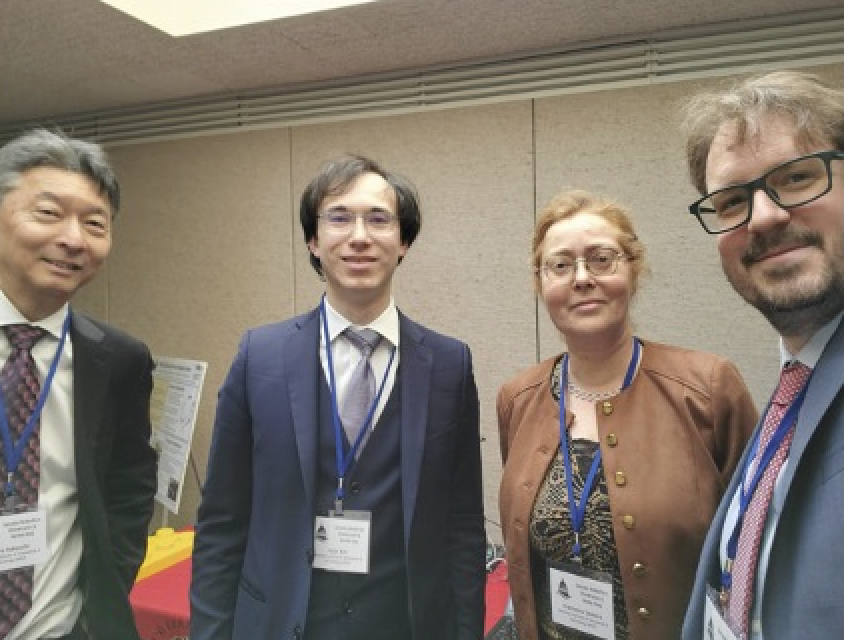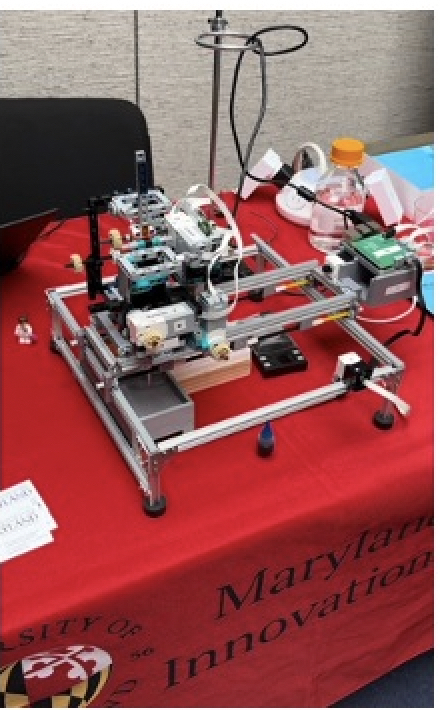LEGOLAS participates at U.S. Senate Robotics Showcase on Capitol Hill
University of Maryland Materials Science and Engineering (MSE) faculty, Ichiro Takeuchi and A. Gilad Kusne, together with MSE undergrad Ryan Kim, participated in the U.S. Senate Robotics Showcase and Demo Day on April 30th at the U.S. Capitol. They were invited by the Offices of Senator Martin Heinrich (D-New Mexico) and Senator Todd Young (R-Indiana) to demonstrate operation of their autonomous robot science kit LEGOLAS (LEGO-based Low-cost Autonomous Scientist). LEGOLAS was developed as a simple yet effective educational tool for teaching the concept of autonomous science. The showcase event was organized by IEEE and Carnegie Mellon University. LEGO pieces such as motors, rails, and sensors are used for the mini laboratory construction, which carries out simple experiments in a self-driving manner [1]. LEGOLAS learns the laws of physics or chemistry by itself. In one example exercise, LEGOLAS selects a particular mixing ratio of two chemicals, and after measuring the property of the mixture, moves on to the next ratio. In this “closed-loop” manner, it continues to self-navigate the sequence of experiments, until a desired property is achieved. LEGOLAS was developed as a collaboration between UMD, the National Institute of Standards and Technology (NIST), and Maryland Energy & Sensor Technologies, LLC. “Autonomous is not just for cars and drones. Autonomous is the future of manufacturing and science,” explains Kusne, an adjunct MSE professor and research scientist at NIST. “The funny thing is there are industrial scale equipment to do essentially the same thing which can cost hundreds of thousands of dollars. We wanted to build a simple kit which can be used to reach a wide range of students in a classroom setting,” says Kusne.
Kusne and Takeuchi have been co-teaching the machine learning for materials science class at UMD for the last four years. LEGOLAS is the final project for the course, which is offered to engineering undergraduates and graduate students at UMD, but LEGOLAS teaching modules for middle and high school students are in the works. The current LEGOLAS module has already been adopted by several other universities. Kim, who just graduated with a B.S. in MSE, worked on developing a new demo experiment for LEGOLAS as an undergraduate research project. “It was super exciting to meet people in the Congress and talk about autonomous materials science,” says Kim. He is pursuing graduate work at UMD this fall, and plans to use LEGOLAS for actual discovery of new energy materials such as photovoltaics and catalysts. Takeuchi noted “I think the highlight of the showcase day was when Congressman Bill Foster (D-Illinois, the only PhD scientist in Congress) stopped by our booth, and we had an in-depth conversation about what LEGOLAS can be used for beyond education”. Kusne and Takeuchi have worked extensively on autonomous materials science over the years, which previously led to the discovery of a best-in-class phase change memory material [2] and demonstration of autonomous neutron diffraction at Oak Ridge National Laboratory [3]. Some of their current advanced projects include autonomous semiconductor manufacturing and metal additive manufacturing. [1] Logan Saar, Haotong Liang, Alex Wang, Austin McDannald, Efrain Rodriguez, Ichiro Takeuchi, A Gilad Kusne, “The LEGOLAS Kit: A low-cost robot science kit for education with symbolic regression for hypothesis discovery and validation,” MRS Bulletin 47 (9), 881-885 . [2] A. Gilad Kusne, Heshan Yu, Changming Wu, Huairuo Zhang, Jason Hattrick-Simpers, Brian DeCost, Suchismita Sarker, Corey Oses, Cormac Toher, Stefano Curtarolo, Albert V. Davydov, Ritesh Agarwal, Leonid A. Bendersky, Mo Li, Apurva Mehta, Ichiro Takeuchi,"On-the-fly Closed-loop Autonomous Materials Discovery via Bayesian Active Learning," Nature Communications 11, 5966 (2020). [3] Austin McDannald, Matthias Frontzek, Andrei T Savici, Mathieu Doucet, Efrain E Rodriguez, Kate Meuse, Jessica Opsahl-Ong, Daniel Samarov, Ichiro Takeuchi, William Ratcliff, A Gilad Kusne, “On-the-fly autonomous control of neutron diffraction via physics-informed Bayesian active learning,” Applied Physics Reviews 9, 021408 (2022).
Watch YouTube videos of LEGOLAS (creidit: Logan Saar) https://www.youtube.com/watch?v=Ul9sx29vAXE https://www.youtube.com/watch?v=TtPM7zXI5kQ Interested in learning machine learning for materials science? Sign up to attend Machine Learning for Materials Research Bootcamp, in its 9th year, at https://umd-mse.catalog.instructure.com/courses/mlmr-2024
Related Articles: May 20, 2024 Prev Next |



